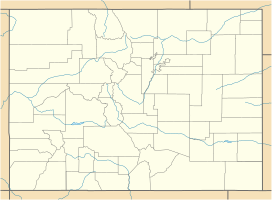Ute Pass
| Ute Pass | |
|---|---|

Rising out of Ute Pass. Pike's Peak Auto Highway (Colorado), 1924.
|
|
| Elevation | 9,165 ft (2,793 m) |
| Traversed by |
|
| Location |
Teller County, Colorado United States |
| Range | Front Range |
| Coordinates | 38°56′30″N 105°09′25″W / 38.94167°N 105.15694°WCoordinates: 38°56′30″N 105°09′25″W / 38.94167°N 105.15694°W |
| Topo map | USGS Divide |
| Location in Colorado | |
The Ute Pass is a mountain pass west of Colorado Springs that ranges from a peak elevation at Divide of 9,165 to 6,165 feet (2,793 to 1,879 m) at its lowest point.
About 75,000 years ago glaciers moved down the sides of what became Pikes Peak. Over time, the ground also thrusted upward. The combination of the change in terrain from the moving tectonic plates and the sculpting of rock due to the moving boulders created the steep canyons of the Ute Pass entrance. From the entrance of Ute Pass at Manitou Springs and for about 5 miles, the terrain is steep canyon land and the road has many curves. The terrain becomes less steep, eventually becoming "gentle u-shaped valleys" near the summit at Divide.
Ute Pass is located west of Colorado Springs, to the north of Pikes Peak and is located along U.S. Highway 24. From west to east, the pass traverses through Divide, Woodland Park, Green Mountain Falls, Chipita Park and Cascade. Its waters collect through the mountains of Ute Pass, through Fountain Creek canyon west of Manitou Springs and collect in Fountain Creek.
Ute Pass between Cascade and Woodland Park
Ute Pass west of Woodland Park
Ute Pass Summit sign
Ute Trail, which runs along the north side of Pikes Peak is believed to have first been a buffalo trail that delivered buffalo from the "milder winter pastures of the eastern plains" to the "lush, grassy" meadows of South Park, Colorado during the summer months. Joel Palmer wrote in his 1847 Journal of Travels over the Rocky Mountains: "These (buffalo) paths are remarkable in their appearance, being about 15 inches wide, and four inches deep, and worn into the soil as smoothly as they could be cut with a spade."
...
Wikipedia

